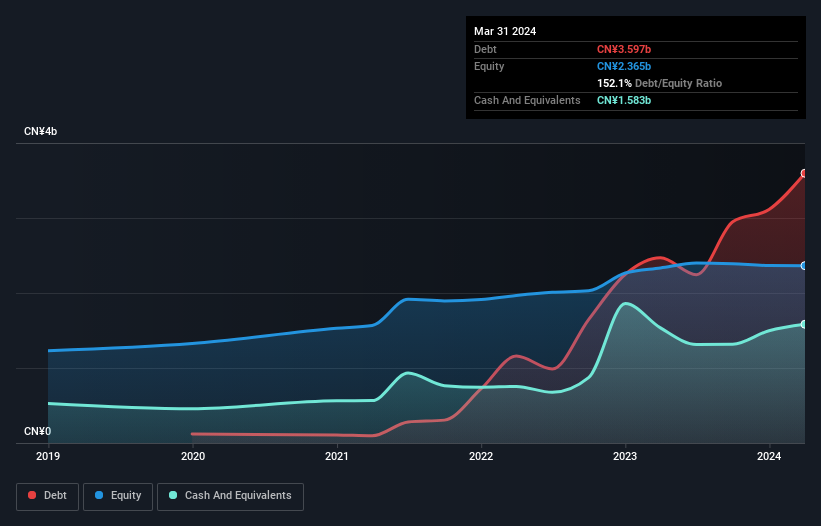- China
- /
- Food and Staples Retail
- /
- SZSE:301017
ShuYu Civilian Pharmacy (SZSE:301017) Use Of Debt Could Be Considered Risky

Some say volatility, rather than debt, is the best way to think about risk as an investor, but Warren Buffett famously said that 'Volatility is far from synonymous with risk.' It's only natural to consider a company's balance sheet when you examine how risky it is, since debt is often involved when a business collapses. Importantly, ShuYu Civilian Pharmacy Corp., Ltd. (SZSE:301017) does carry debt. But the real question is whether this debt is making the company risky.
Why Does Debt Bring Risk?
Debt is a tool to help businesses grow, but if a business is incapable of paying off its lenders, then it exists at their mercy. Ultimately, if the company can't fulfill its legal obligations to repay debt, shareholders could walk away with nothing. However, a more frequent (but still costly) occurrence is where a company must issue shares at bargain-basement prices, permanently diluting shareholders, just to shore up its balance sheet. Of course, the upside of debt is that it often represents cheap capital, especially when it replaces dilution in a company with the ability to reinvest at high rates of return. The first step when considering a company's debt levels is to consider its cash and debt together.
Check out our latest analysis for ShuYu Civilian Pharmacy
What Is ShuYu Civilian Pharmacy's Debt?
You can click the graphic below for the historical numbers, but it shows that as of March 2024 ShuYu Civilian Pharmacy had CN¥3.60b of debt, an increase on CN¥2.47b, over one year. On the flip side, it has CN¥1.58b in cash leading to net debt of about CN¥2.01b.

A Look At ShuYu Civilian Pharmacy's Liabilities
Zooming in on the latest balance sheet data, we can see that ShuYu Civilian Pharmacy had liabilities of CN¥5.35b due within 12 months and liabilities of CN¥1.85b due beyond that. Offsetting this, it had CN¥1.58b in cash and CN¥1.46b in receivables that were due within 12 months. So it has liabilities totalling CN¥4.16b more than its cash and near-term receivables, combined.
This deficit is considerable relative to its market capitalization of CN¥4.17b, so it does suggest shareholders should keep an eye on ShuYu Civilian Pharmacy's use of debt. Should its lenders demand that it shore up the balance sheet, shareholders would likely face severe dilution.
We use two main ratios to inform us about debt levels relative to earnings. The first is net debt divided by earnings before interest, tax, depreciation, and amortization (EBITDA), while the second is how many times its earnings before interest and tax (EBIT) covers its interest expense (or its interest cover, for short). This way, we consider both the absolute quantum of the debt, as well as the interest rates paid on it.
ShuYu Civilian Pharmacy shareholders face the double whammy of a high net debt to EBITDA ratio (6.7), and fairly weak interest coverage, since EBIT is just 2.2 times the interest expense. The debt burden here is substantial. Worse, ShuYu Civilian Pharmacy's EBIT was down 42% over the last year. If earnings continue to follow that trajectory, paying off that debt load will be harder than convincing us to run a marathon in the rain. The balance sheet is clearly the area to focus on when you are analysing debt. But you can't view debt in total isolation; since ShuYu Civilian Pharmacy will need earnings to service that debt. So when considering debt, it's definitely worth looking at the earnings trend. Click here for an interactive snapshot.
Finally, a business needs free cash flow to pay off debt; accounting profits just don't cut it. So we clearly need to look at whether that EBIT is leading to corresponding free cash flow. In the last three years, ShuYu Civilian Pharmacy created free cash flow amounting to 8.1% of its EBIT, an uninspiring performance. That limp level of cash conversion undermines its ability to manage and pay down debt.
Our View
On the face of it, ShuYu Civilian Pharmacy's net debt to EBITDA left us tentative about the stock, and its EBIT growth rate was no more enticing than the one empty restaurant on the busiest night of the year. And furthermore, its conversion of EBIT to free cash flow also fails to instill confidence. Taking into account all the aforementioned factors, it looks like ShuYu Civilian Pharmacy has too much debt. That sort of riskiness is ok for some, but it certainly doesn't float our boat. When analysing debt levels, the balance sheet is the obvious place to start. However, not all investment risk resides within the balance sheet - far from it. We've identified 3 warning signs with ShuYu Civilian Pharmacy (at least 1 which shouldn't be ignored) , and understanding them should be part of your investment process.
If you're interested in investing in businesses that can grow profits without the burden of debt, then check out this free list of growing businesses that have net cash on the balance sheet.
New: Manage All Your Stock Portfolios in One Place
We've created the ultimate portfolio companion for stock investors, and it's free.
• Connect an unlimited number of Portfolios and see your total in one currency
• Be alerted to new Warning Signs or Risks via email or mobile
• Track the Fair Value of your stocks
Have feedback on this article? Concerned about the content? Get in touch with us directly. Alternatively, email editorial-team (at) simplywallst.com.
This article by Simply Wall St is general in nature. We provide commentary based on historical data and analyst forecasts only using an unbiased methodology and our articles are not intended to be financial advice. It does not constitute a recommendation to buy or sell any stock, and does not take account of your objectives, or your financial situation. We aim to bring you long-term focused analysis driven by fundamental data. Note that our analysis may not factor in the latest price-sensitive company announcements or qualitative material. Simply Wall St has no position in any stocks mentioned.
Have feedback on this article? Concerned about the content? Get in touch with us directly. Alternatively, email editorial-team@simplywallst.com
About SZSE:301017
ShuYu Civilian Pharmacy
Operates a chain of pharmaceutical retail stores in China.
Slightly overvalued with imperfect balance sheet.
Market Insights
Community Narratives




